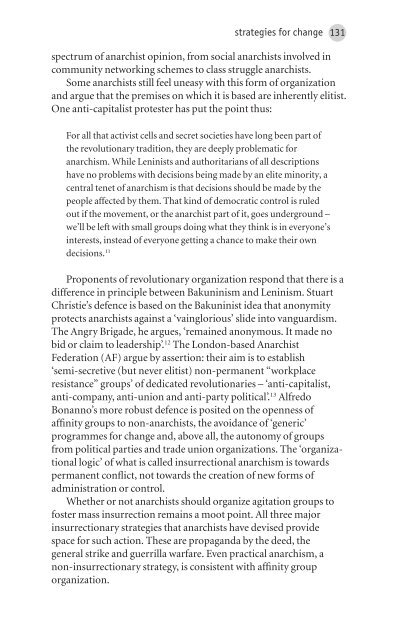o_195qg5dto17o4rbc85q1ge61i84a.pdf
Create successful ePaper yourself
Turn your PDF publications into a flip-book with our unique Google optimized e-Paper software.
strategies for change 131<br />
spectrum of anarchist opinion, from social anarchists involved in<br />
community networking schemes to class struggle anarchists.<br />
Some anarchists still feel uneasy with this form of organization<br />
and argue that the premises on which it is based are inherently elitist.<br />
One anti-capitalist protester has put the point thus:<br />
For all that activist cells and secret societies have long been part of<br />
the revolutionary tradition, they are deeply problematic for<br />
anarchism. While Leninists and authoritarians of all descriptions<br />
have no problems with decisions being made by an elite minority, a<br />
central tenet of anarchism is that decisions should be made by the<br />
people affected by them. That kind of democratic control is ruled<br />
out if the movement, or the anarchist part of it, goes underground –<br />
we’ll be left with small groups doing what they think is in everyone’s<br />
interests, instead of everyone getting a chance to make their own<br />
decisions. 11<br />
Proponents of revolutionary organization respond that there is a<br />
difference in principle between Bakuninism and Leninism. Stuart<br />
Christie’s defence is based on the Bakuninist idea that anonymity<br />
protects anarchists against a ‘vainglorious’ slide into vanguardism.<br />
The Angry Brigade, he argues, ‘remained anonymous. It made no<br />
bid or claim to leadership’. 12 The London-based Anarchist<br />
Federation (AF) argue by assertion: their aim is to establish<br />
‘semi-secretive (but never elitist) non-permanent “workplace<br />
resistance” groups’ of dedicated revolutionaries – ‘anti-capitalist,<br />
anti-company, anti-union and anti-party political’. 13 Alfredo<br />
Bonanno’s more robust defence is posited on the openness of<br />
affinity groups to non-anarchists, the avoidance of ‘generic’<br />
programmes for change and, above all, the autonomy of groups<br />
from political parties and trade union organizations. The ‘organizational<br />
logic’ of what is called insurrectional anarchism is towards<br />
permanent conflict, not towards the creation of new forms of<br />
administration or control.<br />
Whether or not anarchists should organize agitation groups to<br />
foster mass insurrection remains a moot point. All three major<br />
insurrectionary strategies that anarchists have devised provide<br />
space for such action. These are propaganda by the deed, the<br />
general strike and guerrilla warfare. Even practical anarchism, a<br />
non-insurrectionary strategy, is consistent with affinity group<br />
organization.




